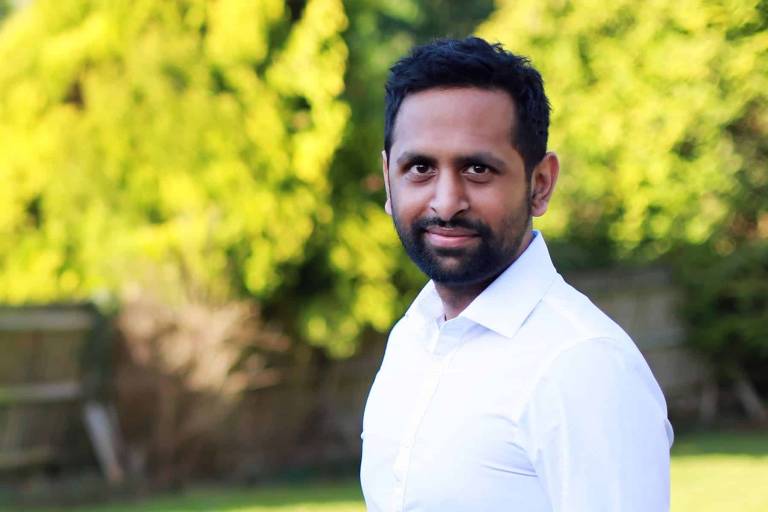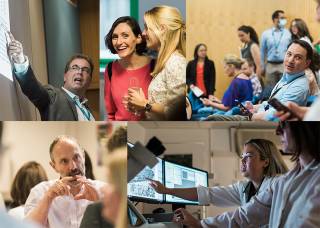We speak to Dipesh Patel, co-director for the Orthoptics MSc at UCL Institute of Ophthalmology, about his career and the unique Orthoptics (pre-registration) MSc.

Tell me more about your background – it would be great to find out more about your education and career so far.
I moved to London ten years ago to undertake my PhD at UCL Great Ormond Street Institute of Child Health (ICH), working with a team of epidemiologists, statisticians and clinicians to deliver a study about the assessment of peripheral vision in children with complex eye disease. Prior to that, I worked clinically as an Orthoptist in Bath. Since completing my PhD, I have held post-doctoral Fellowships from CLAHRC North Thames, balancing research at UCL and clinical practice at Moorfields Eye Hospital.
I am now an NIHR Advanced Fellow at ICH, leading research into the management of amblyopia (lazy eye) in collaboration with scientists across multiple institutions, while continuing to work clinically at Moorfields and co-leading the UCL Institute of Ophthalmology’s Orthoptics (pre-registration) MSc.
The pioneering MSc programme was designed to fast-track students into a clinical career and prepare them for future career progression such as advanced/extended clinical roles and/or developing as a clinical academic.
There are a number of professions working in eye health - Orthoptist, Optometrist or Ophthalmologist – what is an orthoptist and how does it differ from the other professions?
Orthoptists are one of the 14 allied health professions (AHPs). Others in this group include physiotherapists, speech and language therapists and radiographers. We primarily investigate, diagnose and manage people with developmental eye/vision and eye movement disorders due to conditions such as diabetes, hypertension, endocrine dysfunction, cancer, trauma and stroke.
Orthoptists generally work in an NHS hospital setting as part of a multi-disciplinary team alongside optometrists and ophthalmologists. Our Deputy Head Orthoptist at Moorfields Eye Hospital, Andrew Wenborn, describes his role and what it means to be an Orthoptist in this video.
Why should someone pursue a career as an Orthoptist?
At its core, being an Orthoptist allows you to practice as a healthcare professional in a specialist area that hugely exciting and interesting. Orthoptists have a huge impact on people’s eyesight and quality of life and thus it is a hugely rewarding career.
What is unique about the Orthoptics (pre-registration) MSc programme at UCL?
Currently, UCL is the only place in the UK that offers a dedicated accelerated-learning graduate-entry programme to become an Orthoptist. That means that training can be completed in two years (versus three or four years elsewhere). We’re also hugely fortunate to be located at a world-leading centre for ophthalmic research, teaching and healthcare. This rare combination means that our students benefit from high-quality teaching from leading academics and subject experts embedded in practice.
What are you looking for in ideal candidates that apply to this programme?
Firstly, I think it’s important to highlight that graduate-entry programmes draw in people from many different areas – and that in itself is a huge strength when developing the future workforce. Our current students bring with them expertise from other areas of ophthalmic practice, biological/medical and social sciences, and arts/humanities, and will bring this knowledge/experience with them into their training and future practice.
However, there are common traits that we look for in our admissions process. These comprise core characteristics that are the makings of an excellent, caring clinician. Applicants are asked to submit a well-written statement that articulates their rationale for applying, why they’re well-suited to undertake the programme and a brief outlook on their career aspirations. During interviews, we look for applicants to demonstrate good potential in critical thinking skills, leadership, communication, empathy, problem-solving, time management and teamwork – all key skills for future clinicians that can be honed during their time at UCL.
Can you tell us more about the clinical placements on this programme?
We’re very fortunate to be able to work together with other Orthoptic education providers and NHS Trusts to deliver our clinical placements. In the first term, our students go to a local placement site once a week to get first-hand experience of a clinical environment and put their early learning about clinical assessment straight into practice.
Throughout the rest of the programme, placements are arranged in four-week blocks. Our students mostly go to Trusts in the south of England, but they can be placed further away. These block placements allow our students a good amount of time to really put their learning into practice with real patients, under the supervision/guidance of hugely experienced clinical tutors. In total, our students spend 1,000 hours on placement over the two-year programme. We’re commonly told that this is the most enjoyable part of the training.
Where can you go with an Orthoptics degree?
Orthoptic practice is hugely varied and so graduates from our programme will have lots of options when it comes to shaping their careers. Most usually start with a few years of core clinical practice in a hospital setting and then have many choices about how to progress. These include, but are not limited to, extended roles in acute and emergency eye care, glaucoma, cataract, medical retina, undertaking research, education and leadership/management.
Employment opportunities are plentiful and now is a great time to join the profession as Orthoptists will play a key role in not only delivering core Orthoptic care but also filling burgeoning roles in wider ophthalmic care in the next 20 years.
 Close
Close



